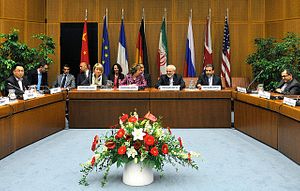Negotiators from Iran and the group of six states known as the P5+1 (comprising the United States, Russia, China, France, the United Kingdom, and Germany) are meeting once again in Geneva in an attempt to maintain momentum toward a comprehensive deal on Iran’s nuclear program. Negotiators from both sides failed to reach a final agreement by the previous deadline of November 24, 2014. Instead, talks were extended until the beginning of July 2015. Both sides have further stressed the importance of reaching a framework agreement by an earlier deadline of March 1. While both sides have considerably more clarity on the key issues, demands, and constraints facing each party, a series of new factors will likely complicate the swift conclusion of a deal.
First, while the negotiations involve seven countries, their progress and momentum has largely been conditioned by the United States. The Obama administration placed considerable domestic political capital on the line in order to push forward with Iran on these nuclear negotiations. Following the conclusion of an interim deal last November, the administration was extensively criticized by Republican opponents for making too many concessions to Iran (even though, the interim deal was by all measures a victory for the P5+1, with Iran receiving disproportionately low benefits to what it was conceding). With Republicans sweeping U.S. midterm elections and taking control of the U.S. Senate, the Obama administration’s hands will be tied further. Any aspects of the deal that requiring congressional approval will be a tough sell back home.
Pressure is growing too on the Iranian side. Following last year’s interim deal, Iran’s economy experienced a bullish surge of the sort it hadn’t seen in years. Recent reports following the failure to meet November’s negotiation deadline suggest that investors are losing confidence in Iran. The Tehran Stock Exchange Index lost 20 percent over 2014, facing its first year-over-year decline since 2008, according to Bloomberg. As far as investor confidence in Iran goes, the bullish fervor that started with Hassan Rouhani’s election in July 2013 and was bolstered with the November 2013 interim deal, is fast fading. The Iranian government will be eager to restore some of this lost steam in the short-term by signaling that nuclear negotiations are going well.
Second, as negotiations resume, we have a good idea of the primary obstacles to a comprehensive deal. The first outstanding issue, which has been a point of contention for some time, is the scale of Iran’s uranium enrichment capacity following any comprehensive deal. Second, both sides continue to fail to reach any understanding on the speed and manner in which sanctions would be lifted. On its enrichment capacity, Iran continues to emphasize a point that has been a constant through the entire P5+1 negotiation process, going back to before the interim deal was concluded: it wants the P5+1 to recognize, in writing, its right to enrich uranium at an industrial scale. By the same token, Iran is highly resistant to any agreement where it has to take drastic steps in dismantling its existing uranium enrichment hardware, especially without a swift and dramatic lifting of international sanctions.
So far, based on open source comments from negotiators on both sides, there appears to be little progress on these core issues. Leading the negotiating teams this time around in Geneva are familiar faces: Acting Deputy Secretary of State Wendy Sherman for the U.S. negotiating team and Abbas Araghchi and Majid Takht Ravanchi for Iran. It’s worth emphasizing the increased direct bilateral U.S.-Iran interactions with this round of negotiations. If there is a deal to be found, it will likely happen with this final extension of the talks. The outstanding issues are purely political, with most of the technical constraints and details having already been drafted.
































